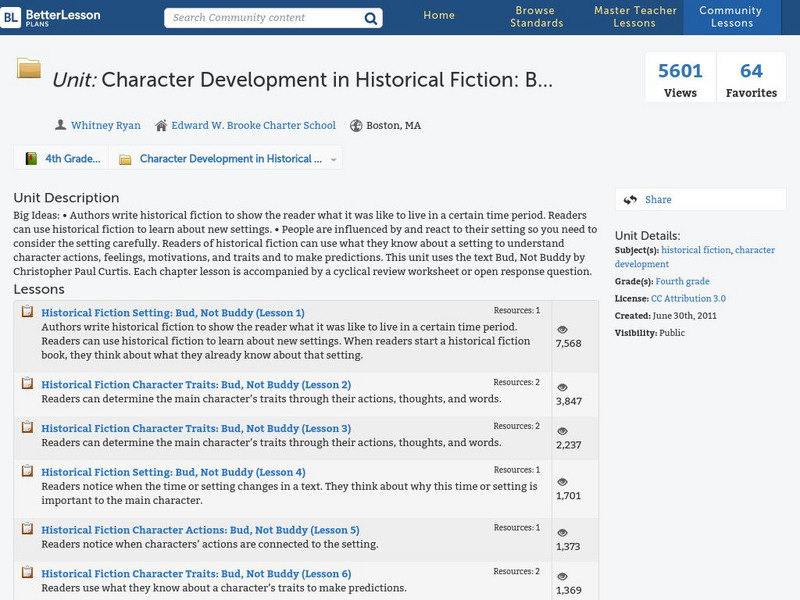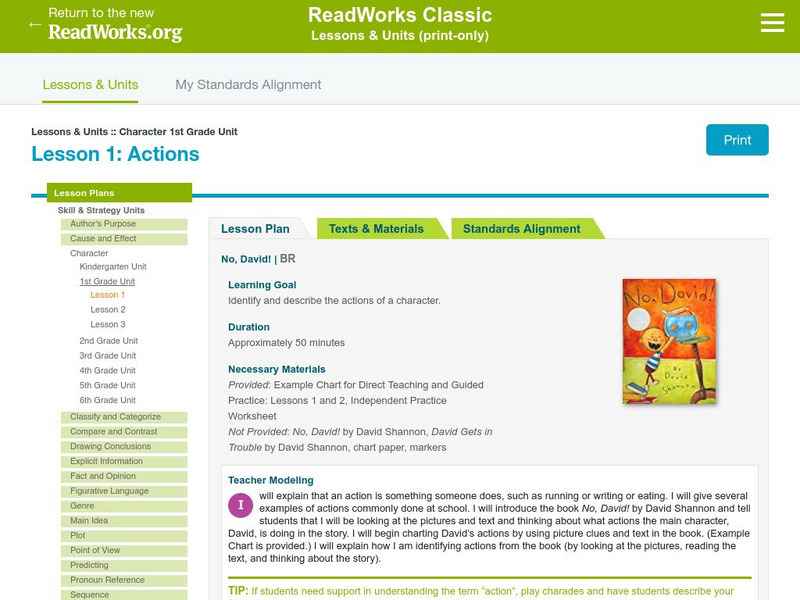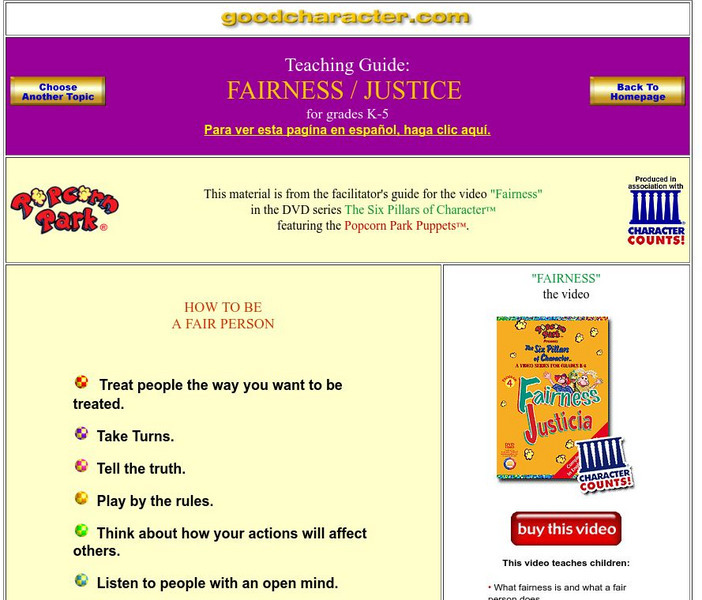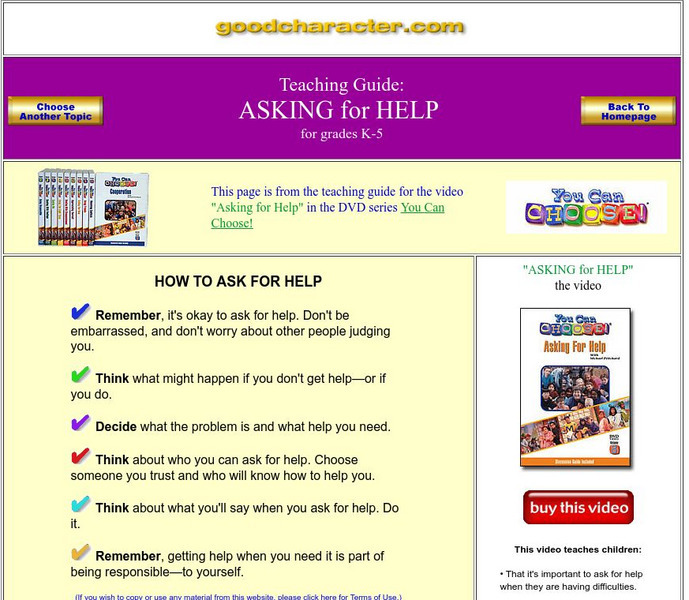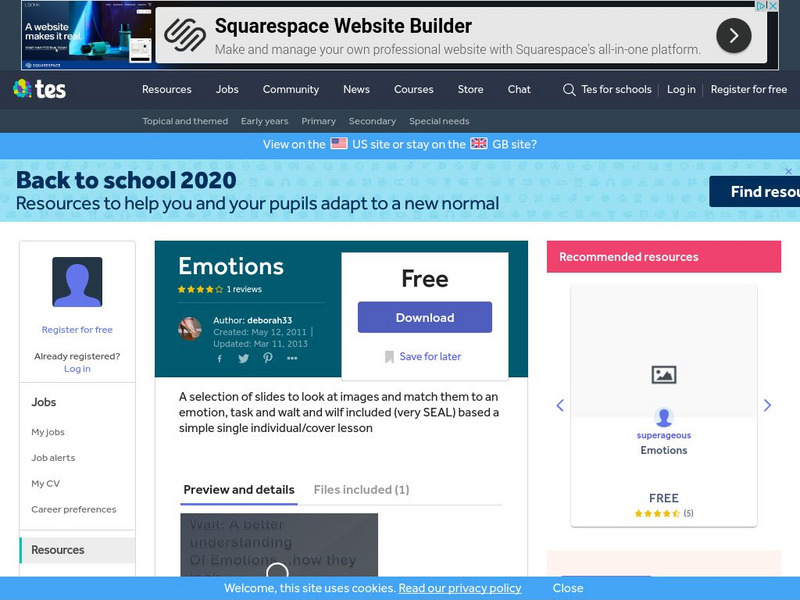Better Lesson
Better Lesson: Unit: Character Development in Historical Fiction: Bud, Not Buddy
Big Ideas: Authors write historical fiction to show the reader what it was like to live in a certain time period. Readers can use historical fiction to learn about new settings. People are influenced by and react to their setting so you...
Live Wire Media
Good Character: Handling Emotions
Know that it is normal to experience different emotions and learn positive ways to deal with your emotions. This website, which is meant to accompany a video on emotions and good character, provides questions for discussion, activity...
Live Wire Media
Good Character: Teaching Guides for K 5
Guides for teaching life skills that range from trustworthiness to conflict resolution. These guides were created for use with a set of videos, "The Six Pillars of Character," but most of the information and ideas can be used without...
Live Wire Media
Good Character: Dealing With Disappointment
Children learn ways of dealing with feelings after being disappointed through simple exercises and tips, as well as questions for discussion and writing prompts. Includes ideas for home assignments and notes for parents.
Character Lab
Character Lab: Emotional Intelligence: A Beginner's Guide to Feelings
How are you feeling today? Recognizing your emotions is critical to emotional development. Emotional intelligence can be learned, practiced, and improved. This blog offers tips for educators and parents on modeling and teaching emotional...
Other
Exercising Character: Fairness [Pdf]
What is fairness? What does it mean to be a fair person? Discuss these questions with the help of "Do's" and "Don'ts" and a lesson plan through which "Participants will focus on being fair to others in the family."
Austin Independent School District
Austin Independent School District: Character Frame [Pdf]
A graphic organizer designed to help students understand characterization by visualizing a character and describing that character's actions and feelings throughout a story.
Utah Education Network
Uen: Character Education Read Alouds
This lesson plan engages students in reading comprehension strategies related to Patty Lovell's book, Stand Tall, Molly Lou Melon. Students will participate in listening to other stories with the same message and then will determine the...
Character Lab
Character Lab: The Secret: Permission to Feel
Don't assume that the young people in your life are fine. Don't assume that what you see is all there is to know. This blog describes an encounter that a young boy had that helped him feel "seen" and understood by adults. Listening is...
Character Lab
Character Lab: Emotional Intelligence: A Beginner's Guide to Feelings
Emotional intelligence is understanding your feelings and using them wisely. This article discusses the importance of having emotional intelligence and ways to foster it in young people.
Character Lab
Character Lab: The Soul of Empathy: Getting, Not Taking, Perspective
We have all learned how to imagine how someone else is feeling - empathy. However, maybe there is a better way to "walk in someone else's shoes". This blog explains why we shouldn't guess how people are doing and just simply ask.
Read Works
Read Works: Lesson 1: Actions
In this resource, students will practice identifying and describing the actions of a character. Teachers will model these skills through the use of text and pictures from the story No, David! by David Shannon. Students will then draw a...
Alabama Learning Exchange
Alex: Getting to Know Characters
In this language development lesson using the books by Kevin Henkes English Language Learners learn vocabulary and language structures to express feelings, make text-to-self connections, and practice the reading strategy of analyzing...
PBS
Pbs Learning Media: Modern Little Red Riding Hood: Video
As you watch this updated story of Little Red Riding Hood, notice the traits, motivations, and feelings of the characters in the story. Check out the additional activities including Guided viewing. Students describe characters in a story...
Live Wire Media
Good Character: The Six Pillars of Character: Fairness
Learn how to be a fair person. This website lists simple things you can do to be fair to others as well as discussion questions and activity ideas through which young students can think critically about what it means to be fair.
Live Wire Media
Good Character: Listening to Others
Show others that you are a good listener by looking at him or her, listening and not interrupting, asking questions, nodding to show you understand, and repeating what you heard. This website will not only help you become a better...
Live Wire Media
Good Character: Being Friends
There are certain things you must do in order to be a good friend. Find a list of these things at this website as well as questions and activity ideas that will help you discuss friendship with classmates and family.
Live Wire Media
Good Character: Asking for Help
If you need help, don't be afraid to ask! This website, in addition to providing tips to help you ask peers and adults for help, include discussion questions and activities through which students discuss what it means to need and get...
Better Lesson
Better Lesson: Speaking and Listening: Collaborative Conversations
Students will partner read The Kite, by Alma Flor Ada. Then work together in small collaborative groups to describe the character of the mother, the children, or the kitten. Included in this lesson are video demonstrations, printable...
Sophia Learning
Sophia: Indirect vs. Direct Characterization
This lesson introduces indirect (learn about the characters through speech, thoughts, actions, physical description, other character's feelings) and direct characterization (author tells the reader about the character) in fiction...
TES Global
Tes: Emotions
[Free Registration/Login Required] This PowerPoint presentation contains art pieces that deal with different emotions. Students will analyze the art pieces and the associated emotions.
Writing Fix
Writing Fix: Other Bad Cases to Write About
After reading A Bad Case of Stripes by David Shannon the writer will plan an original story where an unusual affliction affects a character and is eventually solved. The students will use strong and memorable details as they convey their...
Louisiana Department of Education
Louisiana Doe: Louisiana Believes: English Language Arts: Grade 3: The Stories Julian Tells
Third graders learn that stories and books are important for learning about themselves and others. This unit allows students to learn how storytelling can be a way to learn about other cultures, pass on family history and traditions, and...
Writing Fix
Writing Fix: Make 'Em Laugh or Cry Or
After sharing chapter 19 of Where The Red Fern Grows by Wilson Rawls as an example of emotion-evoking writing, the young scholars will write their own detailed and emotional paragraphs. Students can draw from background knowledge of a...
Other popular searches
- Infer Character Feelings
- Character Feelings Chart
- Character Feelings in Books
- Inference Character Feelings
- Character Feelings Change
- Pantomine Character Feelings
- Panto Mine Character Feelings
- Character Feelings in Reading


